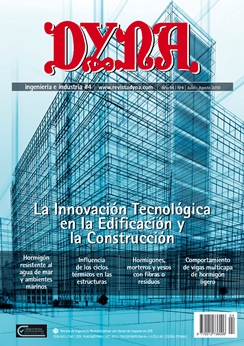MECHANICAL PERFORMANCES OF CEMENT-GYPSUM COMPOSITE MATERIAL CONTAINING A WEAK INTERLAYER WITH DIFFERENT ANGLES
Keywords:
Rock-like material, Weak interlayer, Compression test, Numerical simulation, Material rocoso, Capa intermedia débil, Ensayo de compresión, Simulación numéricaAbstract
The stability of engineering rock mass mainly depends on the mechanical properties of the structural plane. It is difficult to study the mechanical properties of the rock mass without considering the concealment of the structural plane. To study the influence of weak interlayer on mechanical performances of rock-like material with different angles, thicknesses and mechanical parameters, the compression tests were carried out on cement material with gypsum weak interlayer, combined with Mohr-Coulomb criterion analysis and FLAC3D modelling test. Results show that the confining pressure and the weak interlayer play the control role on the strength, deformation and failure modes of the rock-like material. The confining pressure can effectively restrain the stiffness and strength weakening due to weak interlayer of the rock-like material. The strength, elastic modulus and failure characteristics of the rock-like material show strong structural effects. The inclination angle of the structural plane is close to 60°, the strength and stiffness weakening are more obvious. When the inclination angle of the structural plane is close to 0° and 90°, the composite material is mainly characterized by splitting failure; when the inclination angle is close to 15°, the material mainly exhibits shear failure. In other cases, the material mainly exhibits tensile and shear failure modes. The results can provide the theoretical and technical basis for similar engineering practice. Keywords: Rock-like material, Weak interlayer, Compression test, Numerical simulationDownloads
Published
2019-07-01
Issue
Section
ARTICULOS

